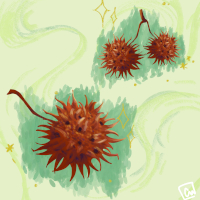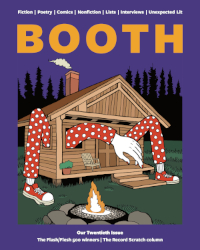Fiction by Aubrey Hirsch
The fucked-up thing is that I can’t remember which baby was which. There were just so many of them. They kept coming out, one after another. One, two, three, four, five. My wife was feverish with contractions, shaking and vomiting from the agonists and the magnesium. She was on her back in the hospital bed, and the babies were pouring out, like water, into my hands, and she pled, “No, please, not another one.” She kept asking, “How many is that?” I answered her over and over again. “One,” I said. Then, “Two.” Then, “Three.” Then I said, “Still just three,” a few times in a row. When I finally said, “Five. That’s all of them. All five,” she fell quiet.
The doctor handed them to me, tiny, hairless things. They were the size of hamsters, and I could see all their ribs.
“Shouldn’t you put them in those glass things?” I asked. We’d known our quintuplets would be early. We’d known they’d spend time in the NICU. But we’d thought we had months yet before we met them.
“Not these babies,” the doctor said. “Not at twenty-one weeks. Maybe at twenty-five weeks.”
“They’re going to die?” I asked. I had three of them in my hands. A nurse was wrapping the other two in blankets: one blue, one pink. “For sure? All of them?”
The doctor gave me a look that said, “For sure. All of them.”
When he left, we took turns holding them. We shifted them around between us as we named them. We hadn’t decided on any names. It was a big job, and we’d thought we had time. But now the names came easily from our lips. “Jamie.” “Sandy.” “Peter.” There was nothing to argue over: no playground bullying in their futures, no introductions to be made. “Alice.” “Joseph.”
Some of the babies were dead already when we were passing them back and forth. The others died, one by one. They were so small; we couldn’t really tell when it happened. A nurse came in after an hour or so and examined them.
“They’ve all gone,” she said, “but you can hold them as long as you want to.”
Knowing they were dead made me not want to touch them, but my wife went on nuzzling them and kissing their tiny, transparent faces. I wanted to say goodbye. I wanted to call them each by name, but we’d scrambled them up so effectively, I didn’t know who was who. I didn’t know which one had opened his eyes to look at me for a moment, which had breathed, feebly, in my arms, and which had been corpses from the start. It was a terrible feeling, not to know my own children.
My wife has healed physically. And emotionally, better than I. She says she felt she expelled some of the sadness with the afterbirth. She could feel it coming out of her like cotton, like barbed wire, like ashes, like snow.
But me? I still carry it with me. It is real and deep, and I want it to break inside me like a fever. I want to expel it now while it is still young, while it will still die. I can see all of their faces. Some are dead. Some are sleeping. They all look the same. I repeat their names over and over to myself like a prayer: JamieSandyPeterAliceJoseph JamieSandyPeterAliceJoseph JamieSandyPeterAliceJoseph JamieSandyPeterAliceJoseph.
* * *



